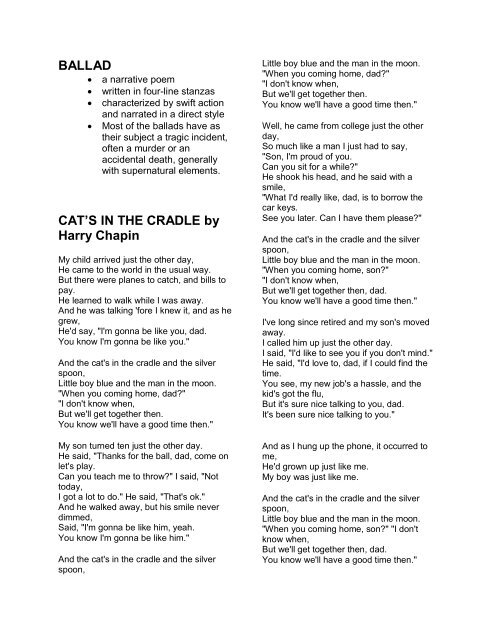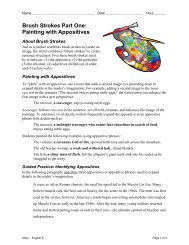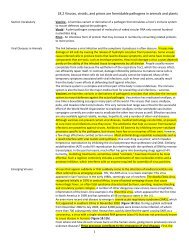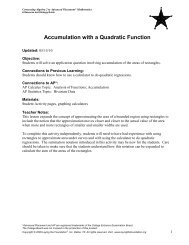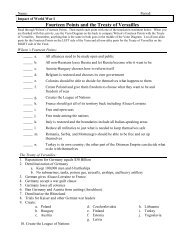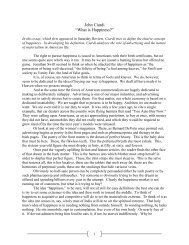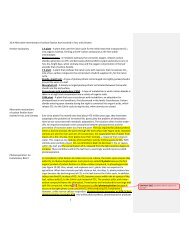BALLAD CAT'S IN THE CRADLE by Harry Chapin - Moore Public ...
BALLAD CAT'S IN THE CRADLE by Harry Chapin - Moore Public ...
BALLAD CAT'S IN THE CRADLE by Harry Chapin - Moore Public ...
Create successful ePaper yourself
Turn your PDF publications into a flip-book with our unique Google optimized e-Paper software.
<strong>BALLAD</strong><br />
<br />
<br />
<br />
<br />
a narrative poem<br />
written in four-line stanzas<br />
characterized <strong>by</strong> swift action<br />
and narrated in a direct style<br />
Most of the ballads have as<br />
their subject a tragic incident,<br />
often a murder or an<br />
accidental death, generally<br />
with supernatural elements.<br />
CAT’S <strong>IN</strong> <strong>THE</strong> <strong>CRADLE</strong> <strong>by</strong><br />
<strong>Harry</strong> <strong>Chapin</strong><br />
My child arrived just the other day,<br />
He came to the world in the usual way.<br />
But there were planes to catch, and bills to<br />
pay.<br />
He learned to walk while I was away.<br />
And he was talking 'fore I knew it, and as he<br />
grew,<br />
He'd say, "I'm gonna be like you, dad.<br />
You know I'm gonna be like you."<br />
And the cat's in the cradle and the silver<br />
spoon,<br />
Little boy blue and the man in the moon.<br />
"When you coming home, dad"<br />
"I don't know when,<br />
But we'll get together then.<br />
You know we'll have a good time then."<br />
My son turned ten just the other day.<br />
He said, "Thanks for the ball, dad, come on<br />
let's play.<br />
Can you teach me to throw" I said, "Not<br />
today,<br />
I got a lot to do." He said, "That's ok."<br />
And he walked away, but his smile never<br />
dimmed,<br />
Said, "I'm gonna be like him, yeah.<br />
You know I'm gonna be like him."<br />
And the cat's in the cradle and the silver<br />
spoon,<br />
Little boy blue and the man in the moon.<br />
"When you coming home, dad"<br />
"I don't know when,<br />
But we'll get together then.<br />
You know we'll have a good time then."<br />
Well, he came from college just the other<br />
day,<br />
So much like a man I just had to say,<br />
"Son, I'm proud of you.<br />
Can you sit for a while"<br />
He shook his head, and he said with a<br />
smile,<br />
"What I'd really like, dad, is to borrow the<br />
car keys.<br />
See you later. Can I have them please"<br />
And the cat's in the cradle and the silver<br />
spoon,<br />
Little boy blue and the man in the moon.<br />
"When you coming home, son"<br />
"I don't know when,<br />
But we'll get together then, dad.<br />
You know we'll have a good time then."<br />
I've long since retired and my son's moved<br />
away.<br />
I called him up just the other day.<br />
I said, "I'd like to see you if you don't mind."<br />
He said, "I'd love to, dad, if I could find the<br />
time.<br />
You see, my new job's a hassle, and the<br />
kid's got the flu,<br />
But it's sure nice talking to you, dad.<br />
It's been sure nice talking to you."<br />
And as I hung up the phone, it occurred to<br />
me,<br />
He'd grown up just like me.<br />
My boy was just like me.<br />
And the cat's in the cradle and the silver<br />
spoon,<br />
Little boy blue and the man in the moon.<br />
"When you coming home, son" "I don't<br />
know when,<br />
But we'll get together then, dad.<br />
You know we'll have a good time then."
The Rainy Day<br />
from Ballads and Other Poems<br />
<strong>by</strong> Henry Wadsworth Longfellow<br />
(1807-1882)<br />
The day is cold, and dark, and dreary<br />
It rains, and the wind is never weary;<br />
The vine still clings to the mouldering wall,<br />
But at every gust the dead leaves fall,<br />
And the day is dark and dreary.<br />
My life is cold, and dark, and dreary;<br />
It rains, and the wind is never weary;<br />
My thoughts still cling to the mouldering Past,<br />
But the hopes of youth fall thick in the blast,<br />
And the days are dark and dreary.<br />
Be still, sad heart! and cease repining;<br />
Behind the clouds is the sun still shining;<br />
Thy fate is the common fate of all,<br />
Into each life some rain must fall,<br />
Some days must be dark and dreary.
The Village Blacksmith<br />
from Ballads and Other Poems<br />
<strong>by</strong> Henry Wadsworth Longfellow<br />
(1807-1882)<br />
Under a spreading chestnut-tree<br />
The village smithy stands;<br />
The smith, a mighty man is he,<br />
With large and sinewy hands;<br />
And the muscles of his brawny<br />
arms<br />
Are strong as iron bands.<br />
His hair is crisp, and black, and<br />
long,<br />
His face is like the tan;<br />
His brow is wet with honest sweat,<br />
He earns whate'er he can,<br />
And looks the whole world in the<br />
face,<br />
For he owes not any man.<br />
Week in, week out, from morn till<br />
night,<br />
You can hear his bellows blow;<br />
You can hear him swing his heavy<br />
sledge,<br />
With measured beat and slow,<br />
Like a sexton ringing the village<br />
bell,<br />
When the evening sun is low.<br />
And children coming home from<br />
school<br />
Look in at the open door;<br />
They love to see the flaming forge,<br />
And bear the bellows roar,<br />
And catch the burning sparks that<br />
fly<br />
Like chaff from a threshing-floor.<br />
He goes on Sunday to the church,<br />
And sits among his boys;<br />
He hears the parson pray and<br />
preach,<br />
He hears his daughter's voice,<br />
Singing in the village choir,<br />
And it makes his heart rejoice.<br />
It sounds to him like her mother's<br />
voice,<br />
Singing in Paradise!<br />
He needs must think of her once<br />
more,<br />
How in the grave she lies;<br />
And with his haul, rough hand he<br />
wipes<br />
A tear out of his eyes.<br />
Toiling,--rejoicing,--sorrowing,<br />
Onward through life he goes;<br />
Each morning sees some task<br />
begin,<br />
Each evening sees it close<br />
Something attempted, something<br />
done,<br />
Has earned a night's repose.<br />
Thanks, thanks to thee, my worthy<br />
friend,<br />
For the lesson thou hast taught!<br />
Thus at the flaming forge of life<br />
Our fortunes must be wrought;<br />
Thus on its sounding anvil shaped<br />
Each burning deed and thought.
Take a familiar plunge.<br />
If you’re dipping your toes into the waters of poetry writing, the ballad is a good place to start,<br />
because the form is both basic and familiar. Whether you’ve taken literature classes, read poetry,<br />
or simply listened to music, you’ve probably heard or read ballads hundreds or thousands of<br />
times.<br />
Structure and tone.<br />
The core structure for a ballad is a quatrain, written in either abcb or abab rhyme schemes. The<br />
first and third lines are iambic tetrameter, with four beats per line; the second and fourth lines are<br />
in trimeter, with three beats per line.<br />
The second ingredient is the story you want to tell. It can be about you, someone you know, a<br />
relationship, or an experience – good, bad, triumphant, or tragic.<br />
To begin, sketch out the tale. Don’t worry about beats per line, rhyme schemes, or stanza breaks.<br />
Simply write the story you want to present as a ballad. Once you’ve written the narrative, pare<br />
down the length and strike all words that don’t drive or describe the action. This bit of editing<br />
will make the conversion process much easier.<br />
Hook your reader.<br />
Now, look at your piece and listen for the beat. Re-form your language into balladic form,<br />
making sure to open with a stanza that sets the table for the story to unfold:<br />
As I walked into the coffeehouse,<br />
I spotted her sipping tea.<br />
She looked up with her forlorn eyes,<br />
Her sadness clear to me.<br />
This particular stanza could take the story in two directions: an elegiac tale of how she became<br />
sad and can’t overcome it or a hopeful story of how interaction with the narrator can lift her from<br />
her malaise. Present a plot that can unfold in a number of ways, and you’ll hook your reader’s<br />
imagination and heart.<br />
She invited me to take a seat,<br />
She had a story to tell,<br />
About the day her husband left,<br />
The day love turned to hell.
Tell your story.<br />
Finish setting the stage in the second quatrain, and then unfold the story with crafty emotion,<br />
letting the natural rhythm of the ballad seep from your mind and heart onto the page.<br />
She gave him everything she had,<br />
Her body, soul and heart,<br />
His old habits got the best of him,<br />
He relapsed; she fell apart.<br />
Off he went on a bender, it seems,<br />
A blur of drugs and drink–<br />
When she confronted him, he said,<br />
"Fine," and took off–just think<br />
Of the pain it caused this woman,<br />
Her eyes folded into her face,<br />
Tears so sharp, bitter and fierce<br />
They’re salting her in place.<br />
Close with authority.<br />
As your ballad winds toward its conclusion, you can retain the rhyme scheme for the closing<br />
stanza or go off-beat with an envoi, or refrain. Either way, use the penultimate quatrain to make<br />
the turn for home and the final quatrain to close the poem with authority.<br />
Yet she turns up at the coffeehouse,<br />
Loneliness not her style,<br />
Through those sad eyes I can tell<br />
She’s yearning for joy, while<br />
Dealing with the tragedy of losing<br />
A man once very sweet,<br />
A man now lost in his shadows,<br />
Her sadness under his feet.<br />
From banal to mystical.<br />
As you develop your narrative, remember the ballad’s focus on music and narrative. Even if you<br />
write the most banal story about going to the grocery store, the music could transform your story<br />
into a mystical piece. So as you revise your story into the ballad form, hone the rhythm and<br />
rhyme, making surprising connections with word-sounds. Focus on the language, and you’ll<br />
surely write something to sing.


